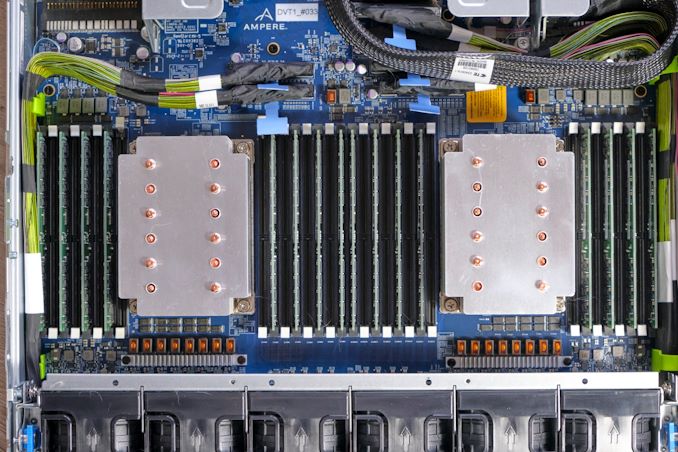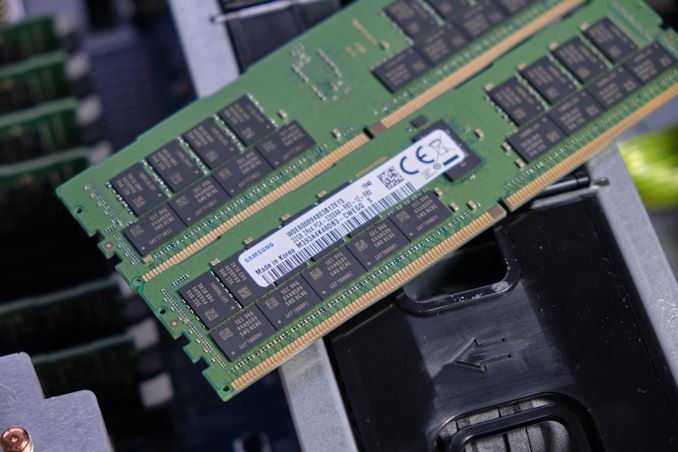The Ampere Altra Review: 2x 80 Cores Arm Server Performance Monster
by Andrei Frumusanu on December 18, 2020 6:00 AM EST- Posted in
- Servers
- Neoverse N1
- Ampere
- Altra
Test Bed and Setup - Compiler Options
For the rest of our performance testing, we’re disclosing the details of the various test setups:
Ampere "Mount Jade" - Dual Altra Q80-33
Obviously, for the Ampere Altra system we’re using the provided Mount Jade server as configured by Ampere.
The system features 2 Altra Q80-33 processors within the Mount Jade DVT motherboard from Ampere.
In terms of memory, we’re using the bundled 16 DIMMs of 32GB of Samsung DDR4-3200 for a total of 512GB, 256GB per socket.
| CPU | 2x Ampere Altra Q80-33 (3.3 GHz, 80c, 32 MB L3, 250W) |
| RAM | 512 GB (16x32 GB) Samsung DDR4-3200 |
| Internal Disks | Samsung MZ-QLB960NE 960GB Samsung MZ-1LB960NE 960GB |
| Motherboard | Mount Jade DVT Reference Motherboard |
| PSU | 2000W (94%) |
The system came preinstalled with CentOS 8 and we continued usage of that OS. It’s to be noted that the server is naturally Arm SBSA compatible and thus you can run any kind of Linux distribution on it.
Ampere makes special note of Oracle’s active support of their variant of Oracle Linux for Altra, which makes sense given that Oracle a few months ago announced adoption of Altra systems for their own cloud-based offerings.
The only other note to make of the system is that the OS is running with 64KB pages rather than the usual 4KB pages – this either can be seen as a testing discrepancy or an advantage on the part of the Arm system given that the next page size step for x86 systems is 2MB – which isn’t feasible for general use-case testing and something deployments would have to decide to explicitly enable.
The system has all relevant security mitigations activated, including SSBS (Speculative Store Bypass Safe) against Spectre variants.
AMD - Dual EPYC 7742
For our AMD system, unfortunately we had hit some issues with our Daytona reference server motherboard, and moved over to a test-bench setup on a SuperMicro H11DSI0.
We’re also equipping the system with 256GB per socket of 8-channel/DIMM DDR4-3200 memory, matching the Altra system.
| CPU | 2x AMD EPYC 7742 (2.25-3.4 GHz, 64c, 256 MB L3, 225W) |
| RAM | 512 GB (16x32 GB) Micron DDR4-3200 |
| Internal Disks | OCZ Vector 512GB |
| Motherboard | SuperMicro H11DSI0 |
| PSU | EVGA 1600 T2 (1600W) |
As an operating system we’re using Ubuntu 20.10 with no further optimisations. In terms of BIOS settings we’re using complete defaults, including retaining the default 225W TDP of the EPYC 7742’s, as well as leaving further CPU configurables to auto, except of NPS settings where it’s we explicitly state the configuration in the results.
The system has all relevant security mitigations activated against speculative store bypass and Spectre variants.
Intel - Dual Xeon Platinum 8280
For the Intel system we’re also using a test-bench setup with the same SSD and OS image actually – we didn’t have enough RAM to run both systems concurrently.
Because the Xeons only have 6-channel memory, their maximum capacity is limited to 384GB of the same Micron memory, running at a default 2933MHz to remain in-spec with the processor’s capabilities.
| CPU | 2x Intel Xeon Platinum 8280 (2.7-4.0 GHz, 28c, 38.5MB L3, 205W) |
| RAM | 384 GB (12x32 GB) Micron DDR4-3200 (Running at 2933MHz) |
| Internal Disks | OCZ Vector 512GB |
| Motherboard | ASRock EP2C621D12 WS |
| PSU | EVGA 1600 T2 (1600W) |
The Xeon system was similarly run on BIOS defaults on an ASRock EP2C621D12 WS with the latest firmware available.
The system has all relevant security mitigations activated against the various vulnerabilities.
Compiler Setup
For compiled tests, we’re using the release version of GCC 10.2. The toolchain was compiled from scratch on both the x86 systems as well as the Altra system. We’re using shared binaries with the system’s libc libraries.












148 Comments
View All Comments
Andrei Frumusanu - Sunday, January 3, 2021 - link
I actually did test those setups:2S Q64-33 setup: 433.7 SPECint2017 - 341.7 SPECfp2017
Pyxar - Wednesday, December 23, 2020 - link
This is cool and all but what could an arm processor server be used for? Aside from some linux compilations there isn't that much support for arm processors.This is looking a lot like the early days of computing where BeBox was powered by PowerPC cpu, a system looking to find a niche that doesn't exist (yet). It was cool for it's time but very little demand for it.
mode_13h - Wednesday, December 23, 2020 - link
Pretty much everything needed to run modern web services has been ported to ARM. I believe a number of high-profile sites are now using Amazon Graviton2, due to its pricing advantage.As for client computing, the Pi has emerged as a basic, usable desktop platform.
mode_13h - Thursday, December 24, 2020 - link
Also, a couple years ago, Nvidia announced support for their entire software stack on ARM host CPUs. So, I'd say it should also be a decent platform for machine learning, now.Bytales - Wednesday, December 23, 2020 - link
You should have tested some CPU mining bechmarks like Monero's randomX, Wownero's randomwow, Turtle's argon2id Chukwa v2, and DERO's AstroBWT. That would have been interesting as shieeet.Miguelxataka - Sunday, January 3, 2021 - link
7742 (15 months ago release) 225w 67.000 point passmark??? why?? 7702 200w 71.000 points passmark. With 7702 the comparision!!7702 (200w) Zen 2 vs Ampere (250w). 20% less power consumption + with Zen 3 20% extra power consumption =36%?
Where are the power efficiency of the RISC/ARM processors here?
Rance - Friday, July 16, 2021 - link
For the specjbb 2015 data, what was the baseline pagesize set to?4KB/64KB/?
Thanks!
sunwins - Tuesday, October 12, 2021 - link
I guess the speccpu2017 test result is wrong.Maybe there were some problems such as bios version or speccpu software configuration.Reference link:
https://www.spec.org/cpu2017/results/rfp2017.html
https://www.spec.org/cpu2017/results/rint2017.html
AMD 7742 speccpu2017 intrate official value:353 per socket
AMD 7742 speccpu2017 intfp official value:270 per socket
INTEL 8280 speccpu2017 intrate official value:172 per socket
INTEL 8280 speccpu2017 intfp official value:141 per socket
Ampere Q80-33 offcial speccpu2017 intrate value:300 per socket
if you hava any question or updation,please touch 799517515@qq.com。